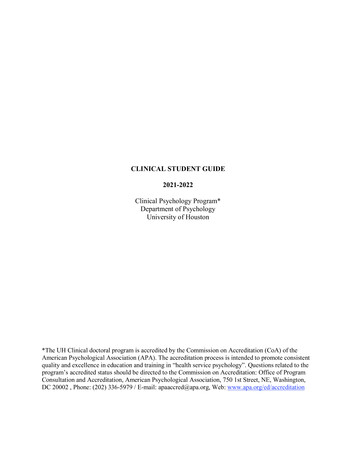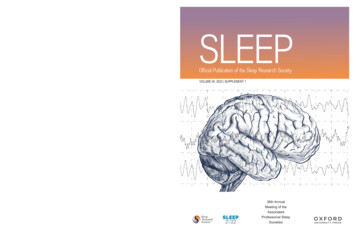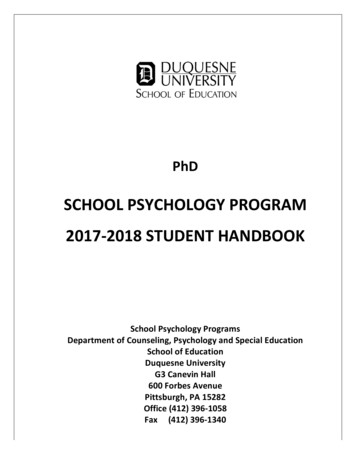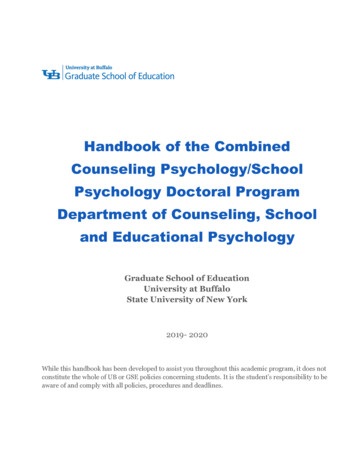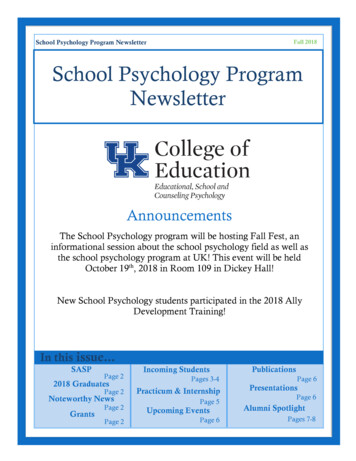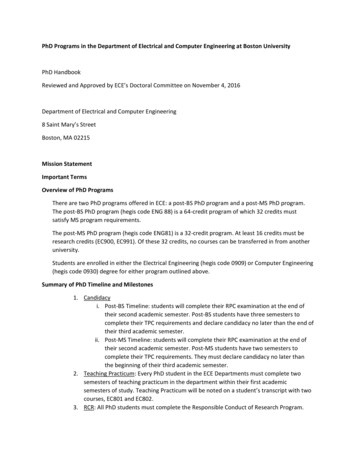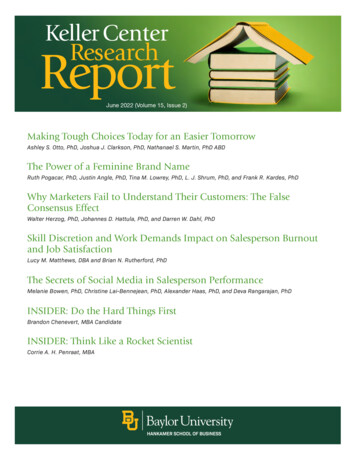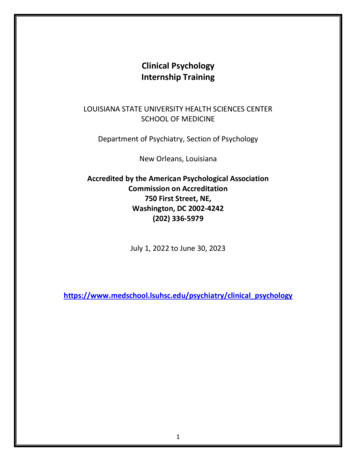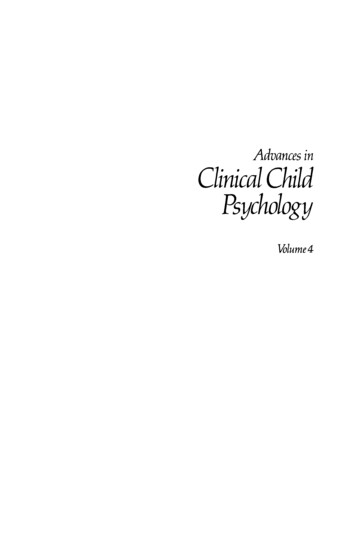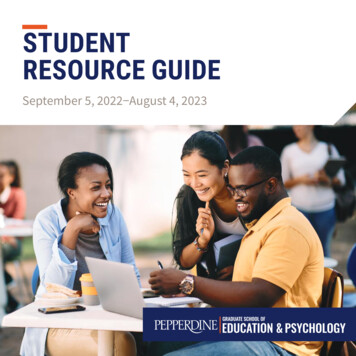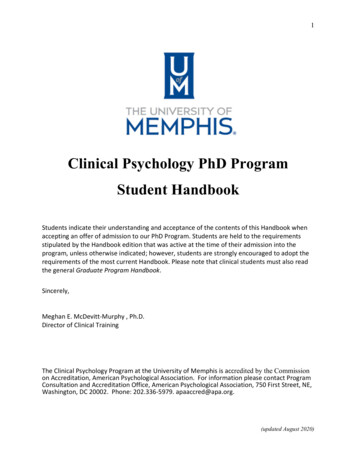
Transcription
1Clinical Psychology PhD ProgramStudent HandbookStudents indicate their understanding and acceptance of the contents of this Handbook whenaccepting an offer of admission to our PhD Program. Students are held to the requirementsstipulated by the Handbook edition that was active at the time of their admission into theprogram, unless otherwise indicated; however, students are strongly encouraged to adopt therequirements of the most current Handbook. Please note that clinical students must also readthe general Graduate Program Handbook.Sincerely,Meghan E. McDevitt-Murphy , Ph.D.Director of Clinical TrainingThe Clinical Psychology Program at the University of Memphis is accredited by the Commissionon Accreditation, American Psychological Association. For information please contact ProgramConsultation and Accreditation Office, American Psychological Association, 750 First Street, NE,Washington, DC 20002. Phone: 202.336-5979. apaaccred@apa.org.(updated August 2020)
Clinical Psych PhD Program Handbook2Table of ContentsPART I:THE UNIVERSITY OF MEMPHIS AND THE PSYCHOLOGY DEPARTMENT . 4The University of Memphis . 4The Psychology Department . 5Organization of the Department . 5Research Areas . 5The Faculty . 6Contacting Faculty Members . 7The Main Office . 7Support Staff . 7Where to Get Forms for Virtually Any Purpose . 8Where to Get Information for Clinical Students . 8Computer Labs . 8Computer Help. 8General Information (keys, security, parking, ID cards, mail, email) . 8The University of Memphis Libraries . 11The Dean of Arts and Sciences . 11The Graduate School. 11Financial Aid and Other Services. 11Your Assistantship. 12Outside Work . 13Diversity Resources and Mission Statement. 13PART II: BEING A GRADUATE STUDENT IN OUR CLINICAL PROGRAM . 16Our Model of Training. 16Program Goals and Objectives . .17Admissions Process . 18Being a Professional . . . .18Online/Social Media Policies. 19Expectations for Active Engagement in Program/Department . 20Working Effectively with your Mentor & other Faculty Members . 20Changing Major Professors . 22Student Evaluations (criteria for evaluating students, expected milestone progress) . 22Withdrawing from the Program and Leaves of Absence . 23Maintaining Good Standing . 24Program Evaluation (providing feedback/suggestions to the clinical program/faculty) . 24The GSCC . 25Student Participation in the Program and the Department . 25Grievances (Grade Disputes, Harassment, Discrimination) and other Complaint Procedures . 26
Clinical Psych PhD Program Handbook3PART III: COURSEWORK, RESEARCH, AND CLINICAL WORK . 28COURSEWORK AND REGISTRATION/GRADUATION ISSUES . 28Permits and Registration . 28Milestone and Independent Study Credits . 29Registering for Classes while on Internship . 29Graduation . 29Graduate Student Forms . 30Selecting Courses . 31Required Courses in Clinical Psychology . 32Transferring Courses from Another University . 33Grades . 34Academic Probation . 34Appealing a Grade . 34Academic Integrity . 34RESEARCH . 35Institutional Review Board (IRB) . 35Psychological Services Center Research Review Board. 35Milestone Proposals and Final Defenses . 35Committees . 38Progress through the Program (four vs. five year plans, etc.) . 38Transferring a Thesis . 41Attending Conferences . 41CLINICAL WORK . 42Clinical Supervisors . 42Learning to be a Therapist (psychotherapy video resources) . 42Tracking your Clinical Hours . . 42The Psychological Services Center . 43Clinical Placements and Practica . 43Selecting a Clinical Placement . 44Internship . 44APPENDIX A: EVALUATION FORMS . 47APPENDIX B: PRACTICUM CONTRACT . .69APPENDIX C: GRADUATE AWARDS AND FELLOWSHIPS . 70APPENDIX D: SUMMARY TABLE FOR MILESTONE FORMS. . .73APPENDIX E: INTERNSHIP AND DISSERTATION REGISTRATION POLICY .74APPENDIX F: GRIEVANCE COMMITTEE POLICIES . .75APPENDIX G: MENTOR MENTEE PROFESSIONAL DEVELOPMENT PLAN . .76
Clinical Psych PhD Program Handbook4PART I: The University of Memphis and the Department of PsychologyThe University of MemphisOpened in 1912, the University of Memphis has developed into an internationallyrecognized institution of higher learning. Today the University educates approximately 23,000students annually, including over 4,000 graduate students. Conveniently located in an attractiveresidential section of Memphis, the University includes 1,160 acres and 202 buildings at eightsites.The University is comprised of eleven distinct academic colleges and schools: the Schoolof Public Health, the College of Arts and Sciences, Fogelman College of Business and Economics,Loewenberg School of Nursing, the School of Audiology and Speech-Language Pathology, CecilC. Humphreys School of Law, the College of Communication and Fine Arts, the College ofEducation, Herff College of Engineering, the University College, and the Graduate School.Although individual schools function as separate entities, each academic division at theUniversity of Memphis is dedicated to the scholarly advancement of its students and facultyand to the betterment of the community.The University of Memphis has vibrant collaborations with a number of well-knownresources in Memphis, including St. Jude Children’s Research Hospital, the University ofTennessee Health Sciences Center, the VA Medical Center, LeBonheur Pediatric ResearchHospital, and Memphis City Schools.The Psychology DepartmentHoused both in its own building and in the Federal Express Institute for EmergingTechnology, the psychology department offers doctoral degrees in clinical, experimental, andschool psychology, as well as a terminal master’s degree, the Master’s of Science in GeneralPsychology. The clinical Ph.D. program has been continuously accredited by the AmericanPsychological Association since 1972, and the master’s in school psychology is accredited by theNational Association of School Psychology (NASP). The Ph.D. in School Psychology Program wasjust accredited by the American Psychological Association in August 2014.In 1984, the Psychology Department's Center for Applied Psychological Research (CAPR)was recognized by the State of Tennessee as an academic Center of Excellence (COE). Fouryears later the department was named as an Accomplished Center of Excellence. As a result,the department enjoys special benefits. The CAPR receives a permanent annual financial awardfrom the state, funds which are available to attract outstanding, nationally-recognized faculty,to facilitate research opportunities, and to offset project costs. Thus, research is a key elementof the department mission.Organization of the DepartmentPsychology faculty and doctoral students belong to one of three programs: the clinicalprogram, the experimental program, or the school program (which includes both a master’sand a doctoral program). In addition, the department has a general master’s program, called
Clinical Psych PhD Program Handbook5the MSGP (“M.S. in General Psychology”). We also have over 800 undergraduate psychologymajors studying in our department.Research AreasYou will find that faculty and student research interests in clinical psychology clusterinto 3 main topics: Clinical Health Psychology, Child and Family Research, and PsychotherapyResearch.These research areas represent our common interests. In addition, they also helppromote collaboration among individuals from different programs. For example, the Child andFamily research area is comprised of students and faculty from clinical, experimental, andschool doctoral programs, as well as MSGP students. In developing your professional identity,you should think of yourself first and foremost as a student in clinical psychology. Although weoffer a generalist program in clinical psychology, each research area has 2-3 specialized coursesand expectations that you conduct related research. Sometimes students are involved in morethan one research area, because their interests lie on the cusp of the two areas. In this case, weallow students to create their own interest area, usually by blending existing areas (e.g., takingone course from Child and Family and one from Clinical Health) or substituting a course in adifferent area (e.g., an advanced statistics/methods course, a course in public health) for one ofthe area requirements. If a student wants to create their own research area, they shouldapproach their Major Professor to discuss the student’s career plans and how a unique researcharea might meet their needs. The Major Professor and student can work together to come upwith training experiences that would be comparable to other research areas but in the topics ofthe student’s special interest. The student would then write up a plan for their research arearequirements, submitting that plan to the Major Professor, DCT, and clinical faculty duringspring evaluations (you can detail the plan in the Annual Performance Review Form youcomplete each May for your yearly evaluation). The plan will then be reviewed for approvalwith their other evaluation materials. Approval of the plan will be communicated in the springevaluation letter. For example, you might choose to develop an emphasis in quantitativemethods or public health by taking additional courses in those areas instead of the three areasdescribed above. All students should have a research area declared or created by the time oftheir 3rd year spring evaluations. This plan should allow the students sufficient time to completetheir planned research, clinical, and coursework goals.Please note that our Clinical Program is a member of the Clinical Child and PediatricPsychology Training Council (CCaPPTC). Child and Family Research area students in the ClinicalProgram complete a training experience that is consistent with the guidelines established byCCaPPTC: ild-and-pediatric-psychologytraining-council/The FacultyThe University of Memphis Psychology Department consists of approximately 30 fulltime faculty members, 20 adjunct faculty (psychologists in the community who teach and/orsupervise our students), 5 postdoctoral fellows, 90 doctoral students, 58 masters’ students, andover 700 undergraduate majors and minors.
Clinical Psych PhD Program Handbook6Several faculty members central to the clinical program are listed below. For a completelist of individual faculty members and their research interests, consult the Psychology GraduateProgram Handbook or visit www.memphis.edu/psychology/people/index.php for the mostcurrent information.Dr. Randy FloydDepartment ChairOffice: 202 & 332Phone: 678-4846Email: rgfloyd@memphis.eduRandy is also a member of the School Psychology Doctoral ProgramDr. Melloni CookAssociate Chair of Research InitiativesOffice: 406Phone: 678-1516Email: mcook1@memphis.eduMelloni is also a member of the Behavioral Neuroscience area.Dr. Helen SableAssociate Chair of Educational InitiativesOffice: 408Phone: 678-4343Email: hjsable@memphis.eduHelen is also a member of the Behavioral Neuroscience area.Dr. Robert CohenDirector of Graduate ProgramsOffice: 340Phone: 678-4679Email: rcohen@memphis.eduBob is in the Child & Family area. In his role as Director of Graduate Programs, he handles issuesthat cross different graduate programs (e.g., clinical, experimental, school).Dr. Meghan McDevitt-MurphyDirector of Clinical Training (DCT)Office: 372Phone: 678-2891Email: mmcdvttm@memphis.eduMeghan oversees the clinical doctoral program and is the “go to” person for all issues involvingthat program.Dr. Brook MarcksAssociate Director of Clinical TrainingOffice: 360Phone: 678-3510Email: bamarcks@memphis.edu
Clinical Psych PhD Program Handbook7Brook is a Clinical Professor in Clinical Psychology and assists in many tasks related to runningthe Clinical Doctoral Program, in addition to teaching and supervising in the PSC.Dr. Francisco Salgado GarciaDirector of the Psychological Services CenterOffice: 126C Phone: 678-3736Email: F.Salgado.Garcia@memphis.eduContacting Faculty MembersOur faculty members are very approachable, so we hope you introduce yourself to asmany as you can. Email addresses and telephone numbers are listed on the departmentwebsite at . Faculty office numbers areposted on the floors of the building and are also listed in the graduate bulletin and thePsychology Graduate Program Handbook. All faculty members have weekly office hours.The Main OfficeThe Main Office is in Room 202, located on the second floor in the southeast corner ofthe building. The Department Chair’s office is in this area, as well as the offices of support staff.If you need general help (e.g., you’ve locked yourself out of your office, you need a map of theuniversity) this is a great place to go.Support staffOne of the reasons that our department functions so smoothly is the help of ourexcellent support staff in the main office (Room 208). Here are a few people you should know:Cynthia Walker is the Graduate Program Secretary and the Assistant to the Director of ClinicalTraining. She is an excellent source of information about issues involving registration.cywshngt@memphis.edu, Room # 326, 678-4340Laura Simpson is the Assistant to the Chair and oversees most main office staff.lsmpson1@memphis.edu, Room 202, 678-4699Office assistants: We typically hire student workers to take care of the front desk in Room 202.They can help with placing book orders if you teach a class and with general needs. They canalso get you keys to your office and the building and schedule rooms for your milestonemeetings. Room 202, 678-2145Belinda Scott is the department Business Officer for issues related to your , Room 220, 678- 4698James Beel is our Local Technical Support Provider—the person who maintains all of ourcomputers. He also maintains and updates our website. If you have difficulty with your labcomputer, email him directly AND put a work order in to him(https://umhelpdesk.memphis.edu/) and email/call him directly at jcbeel@memphis.edu, Room100A (psyc auditorium building) 678-2336
Clinical Psych PhD Program Handbook8Where to Get Forms for Virtually Any PurposeGraduate school requires an unbelievable number of forms—to declare a committeechairperson, to request research hours, to transfer credit, etc. We maintain these forms onlineat esources.php Please make yourselffamiliar with the materials listed here.Computer HelpContact James Beel for computer help: jcbeel@memphis.edu and be sure to place ahelp ticket as well https://umhelpdesk.memphis.edu/GENERAL INFORMATION:KeysKeys to offices and labs are maintained by staff in the main office. Keys for labs require consent(a note, email, or call) from the faculty assigned the lab indicating the room(s) for which youneed a key and the semester time frame for which you will be using it. Students will berequired to fill out a card when obtaining key(s). Students are responsible for the security of thekeys and for returning the keys when they are no longer needed.SecurityGrad students may be in the building at all hours. As always, you should be careful aboutsecurity. There are red security phones ON THE FIRST, SECOND, AND FOURTH FLOOR. Pick upthe receiver and you will be automatically connected to campus police. You can call the campuspolice general number for non-emergencies such as being locked out of your office at night(678-3848). The emergency number to police services is 678-4537 (678-HELP).Tiger Patrol is a personal escort program staffed by students to enhance the safety of personson campus in the evening. There is no need to walk alone and we encourage you to use TigerPatrol if you aren't walking in a group. Normal hours for the Fall and Spring semesters are 6:00p.m. until 2:00 a.m. seven days a week. To request an escort you should call 678-4663 (678HOME).All students who are members of Tiger Patrol have had a criminal background check and are ingood standing with the University. When they arrive by foot or golf cart, you should notice amulticolored lanyard holding an ID that says Tiger Patrol under the person’s name. After TigerPatrol hours, campus police provides escorts until dawn, although response time may bedependent upon officer availability.ParkingGeneral Parking (http://www.memphis.edu/parking/permit/) is paid for through theMaintenance Fee portion of semester tuition. Once the student has registered for classes, asemester validation sticker will be mailed to the address on file with the Student RecordsDepartment. New students are mailed a permit (hangtag) along with a semester validationsticker prior to Fee Payment. The permits (hangtags) run on a three-year cycle and need to be
Clinical Psych PhD Program Handbook9updated every semester. If, for any reason, you do not receive the semester validation stickeror permit through mail, you need to go to the Parking Office the first week of class to obtainone. This validates the permit (hangtag) to be used in General Parking Lots only. The parkingoffice website shows a map of where these lots are on campus. Unfortunately, General Parkingis not free during the summer because you are not taking classes so you have to pay to park oncampus during the summer.Priority Gate Access Parking is available each semester on a first come first serve basis.Availability of parking lots differs each semester but please be aware that the lot closest to ourbuilding (40) sells out quickly and before the start of the semester. Check with the ParkingServices Office for information on space availability. Students may only purchase into a Prioritylot for a given semester during the permit sales window. Evening only access is also availablefor students to purchase. Evening access begins at 4:30p.m. Priority Lots: 6, 7, 18, 19, 37, 43,45, 52, and 53 Parking Garages: Lots 3 and 40.ID CardsIdentification Cards include your student U number (which you will need when registering forclasses etc.) are available in the Ask TOM Answer Center in the Wilder Tower Lobby betweenthe hours of 8:00am-5:00pm Monday-Thursday or 8:00am-4:00pm Friday. Students shouldobtain an ID prior to the start of classes. In order to receive your ID card, you must have pictureidentification with you. You will use this card to check out materials at the library, gain access tothe gym, and gain access to some computer labs on campus. Your card may also be used as adebit card. A 10.00 minimum deposit is required (Bursar’s Office, Wilder Tower). This allows toyou to pay for meals at campus dining locations or to purchase books, supplies, and personalitems at the University Store. You can also use your card in copier machines and for services atthe Health Center and the Bursar's Office. The money will be deducted from your account. Ifyou lose your card, first go to the Bursar’s Office to pay a replacement cost and then take yourreceipt to Wilder Tower Lobby.Computer LabsThe computer labs in Psychology Room 102 (Mac Lab) and Room 103 (PC lab) are available foryou to use. If a class is being conducted in one of the labs, you should wait until it is completedbefore entering. You can also use any TigerLan computer lab on campus. For locations andhours, see https://umwa.memphis.edu/trl/public/computerlabs/ You should have your studentID available for entry.Mail /Copy RoomYou will have a key to the mail/copy room with approval (see key section above), which is Room203. You will also have an assigned mailbox. Note that your box is the box BELOW your name.Faculty mailboxes are also in this room, and also BELOW their names. The copiers require anaccess code, which you can get from your major professor if the copying is work-related. Youcan also pay the front office a small fee for personal use of the copier.
Clinical Psych PhD Program Handbook10EmailAll currently enrolled students have a Universal User ID (UUID) created automatically. The UUIDis a username shared among various services delivered to students, and is the basis of youruniversity email account address, as follows: UUID@memphis.edu. Your university email is theofficial email address used for university correspondence. If you are used to using anotheraccount, you need to have your university email forwarded to your other address. You can usethe ID Management website located at http://www.memphis.edu/its/accounts/uuid.php toadjust your account as needed.Miscellaneous (university questions, technology help, recreation)If you have a question concerning anything that has to do with the university, AskTOM is agreat place to start: http://www.memphis.edu/umtech/asktom.phpThe University of Memphis Information Technology Department provides various softwarefree of charge and for purchase. Please oftware.php for more information anddetails.The university also has a recreation center located south of the railroad tracks. Please see thewebsite at http://www.memphis.edu/cris/ for information on the variety of services it offersincluding free classes, the indoor/outdoor pools, gym, personal trainers and much more.If sports is your interest, the University of Memphis has great athletic teams.For game schedules, tickets, scores and much more, see the athletics page at:http://gotigersgo.collegesports.com/. Students generally receive free or discounted tickets toathletic events.As a student, you are given discounts at area events such as the Orpheum Theatre andPlayhouse on the Square. There are also discounts for Malco movies, the Pink Palace Museumand IMAX Theater, Ballet Memphis, and many more. To check out info
You will find that faculty and student research interests in clinical psychology cluster into 3 main topics: Clinical Health Psychology, Child and Family Research, and Psychotherapy Research. These research areas represent our common interests. In addition, they also help promote collaboration among individuals from different programs.
